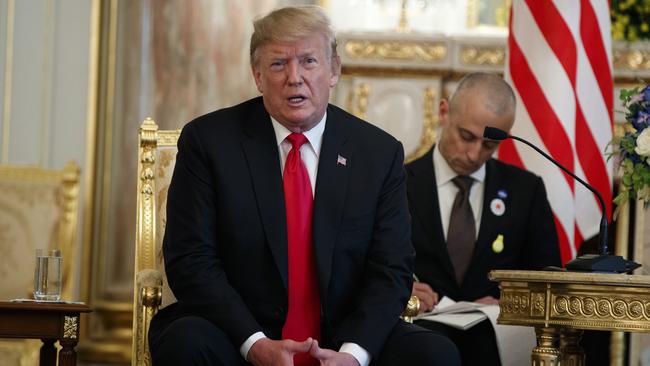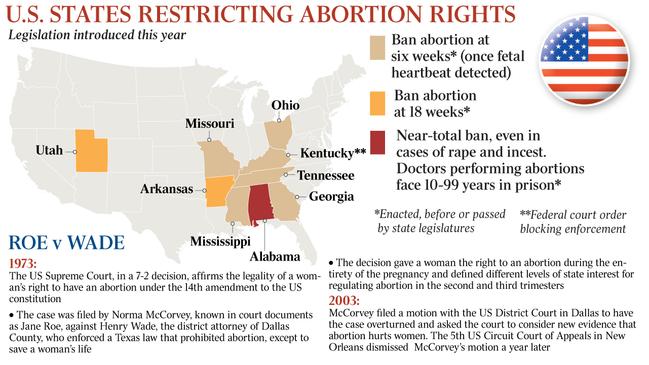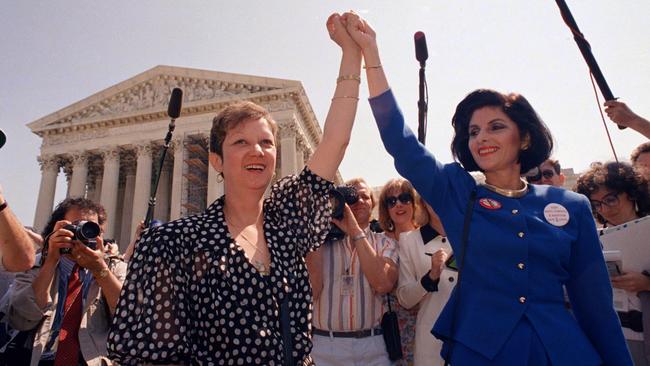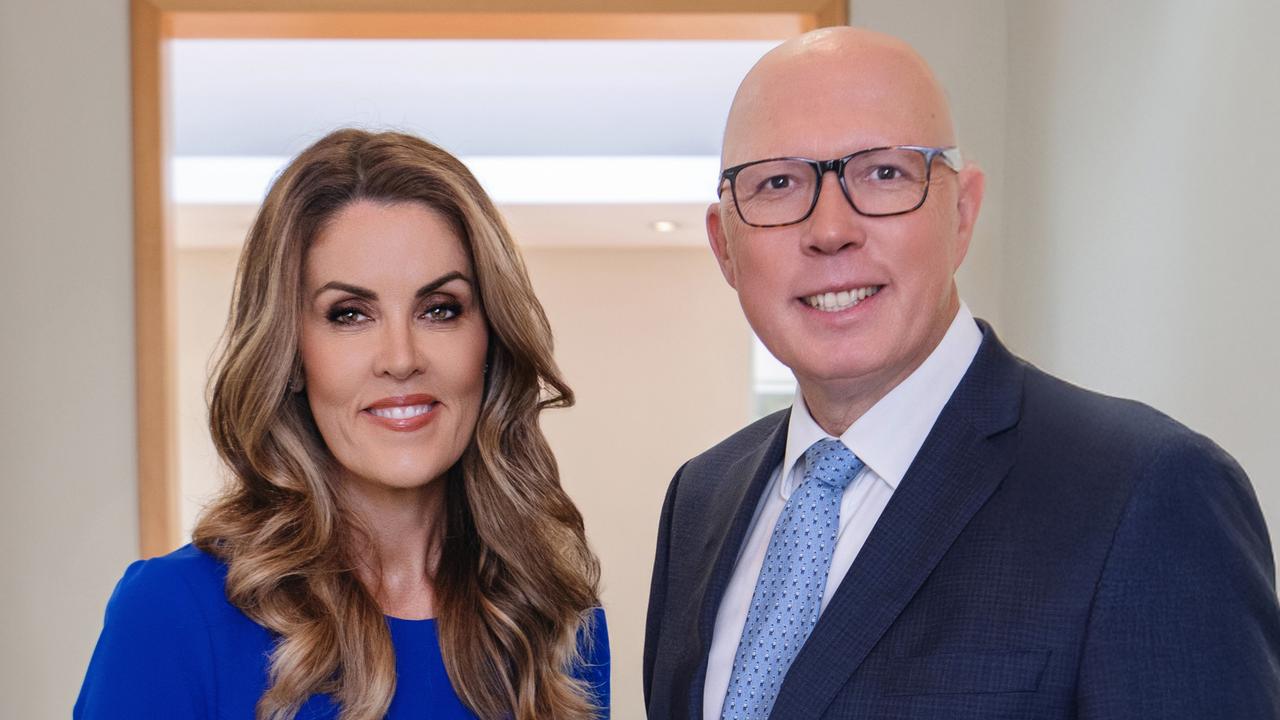Trump’s bible belt dilemma over Supreme Court appointments
With a conservative Supreme Court in place, the anti-abortion rights movement is being galvanised to seize their holy grail.

One of the keys to Donald Trump’s election win in the 2016 US presidential election was his ability to court white evangelical voters.
For many it seemed a strange contradiction that conservative Christians would support the thrice-married Trump, who was accused of extramarital affairs and caught on tape talking disparagingly about women.
Yet Trump offered these voters something they saw as far more important than any personal foibles. He promised to give them a more conservative US Supreme Court that would deliver rulings more in keeping with their beliefs on a raft of subjects from religious freedoms to abortion.
Exit polls after the 2016 ballot showed that white evangelicals voted 80 per cent to 16 per cent for Trump, the highest margin recorded for a Republican candidate.
The US President has delivered on his promise by appointing two conservative judges, Neil Gorsuch and Brett Kavanaugh, to the nine-member US Supreme Court. Kavanaugh’s nomination divided the country because it gave conservatives a crucial 5-4 majority in the court, energising evangelical voters and especially the anti-abortion movement.
Hardliners galvanised
But the events of recent weeks have delivered Trump a dilemma largely of his own making. The evangelical anti-abortion voters he courted in 2016 are pushing hardline policies that, if adopted, would spark a backlash from moderate voters, including many Republicans, in next year’s presidential election.

With a conservative Supreme Court in place, the powerful anti-abortion rights movement in the US is being galvanised by the potential to seize their holy grail: an overthrow of the landmark 1973 Roe v Wade ruling guaranteeing a woman’s right to end her pregnancy.
There is still a long way to go before the Supreme Court decides whether it would take on a challenge to Roe v Wade and, even if it did, it is unclear what its verdict would be. But the anti-abortion movement sees a once-in-a-generation chance to overturn a ruling it has always detested but that has long been accepted by most Americans as a fundamental right.
During the past month a series of conservative Republican states have passed the strictest abortion bills in a generation, setting the stage for legal challenges that could lead the Supreme Court to reassess Roe v Wade.
This month Georgia governor Brian Kemp signed a “foetal heartbeat” bill, which bans abortions after six weeks. The ban takes effect before many women even know they are pregnant.
Kentucky, Mississippi and Ohio also have outlawed abortion after a doctor can detect an embryonic heartbeat.
But the strictest bill, and the most controversial, has been Alabama’s move to make abortion a crime at any stage of pregnancy, with no exceptions for rape or incest. Any doctor in Alabama who performs an abortion will be liable for up to 99 years in prison.
Alabama Lieutenant-Governor Will Ainsworth has openly admitted that the legislation, which veers far from mainstream US opinion, is aimed at provoking a Supreme Court challenge to Roe v Wade.
“It is important that we pass this statewide abortion ban legislation and begin a long-overdue effort to directly challenge Roe v Wade,” he says. “Now that President Trump has supercharged the effort to remake the federal court system by appointing conservative jurists who will strictly interpret the constitution, I feel confidence that the Supreme Court will overturn Roe and finally correct its 46-year mistake.”
Trump’s dilemma
Alabama’s policy is not backed by mainstream Republicans and has put Trump in a difficult place.
Republican house minority leader Kevin McCarthy, former Republican presidential contender Mitt Romney and Republican National Committee chairwoman Ronna McDaniel are among those who have labelled Alabama’s bill “extreme”.
Polls show that despite the steady erosion of abortion clinics in conservative Republican states, national support for the Roe v Wade ruling is strong.
An NBC/Wall Street Journal poll last year found 71 per cent of Americans did not believe Roe v Wade should be overturned, including 52 per cent of Republicans. It was the highest level of support since that poll began in 2005.
Pro-choice groups see the disconnect between the majority opinion on Roe v Wade and the minority position being pushed by states such as Alabama and they sense an opportunity to attack Trump.
“President Trump and his allies have grossly overreached and made a huge political mistake. This is now a fight we can win and will win,” says Leana Wen, head of the pro-choice Planned Parenthood Federation of America.
“No matter what happens next, he owns this attack on American women. He has packed the courts with the intention of overturning Roe v Wade and no amount of fearmongering or distancing from specific laws should distract people from this fact.”
Joshua Wilson, a professor at the University of Denver and author of two books about the politics of abortion, says the debate “is risky for Republicans and could benefit Democrats”.
Trump, who is already less popular with women than men, knows the political risk of giving unqualified support for extreme anti-abortion laws such as those in Alabama.
Amid a national backlash against the Alabama bill, Trump distanced himself from any law that prohibited abortion in cases of rape or incest.
“I am strongly pro-life, with three exceptions — rape, incest and protecting the life of the mother — the same position taken by Ronald Reagan,” Trump tweeted.
He then alluded to the risk of a split among Republicans over the issue, saying: “We must stick together and win … for life in 2020. If we are foolish and do not stay UNITED as one, all our hard fought gains for Life can, and will rapidly disappear.”
Trump’s public stance on abortion has changed across his lifetime and his critics argue he does not have fervently held beliefs on the issue. For at least the past decade Trump has claimed to be strongly anti-abortion. But as recently as 1999, he said: “I’m very pro-choice. I hate the concept of abortion. I hate it. I hate everything it stands for. I cringe when I listen to people debating the subject. But you still — I just believe in choice.”
Overturning Roe v Wade
For the anti-abortion movement, the path to a possible overturning of Roe v Wade remains a difficult one even with a conservative majority in the Supreme Court.
Before the Supreme Court can even consider accepting a case, it must be heard and appealed at a district court level and again at a federal circuit level. The prospects of such a case being rejected in these lower courts is high.

If the case makes it through, the Supreme Court will decide whether to accept the case. The Supreme Court accepts only a handful of cases for consideration each year and four of the nine judges have to agree to accept it.
Even if it does reach the Supreme Court, it is unclear whether the court would take the sweeping step of overturning Roe v Wade.
At Kavanaugh’s contentious confirmation hearing, he said he considered Roe v Wade as “settled law” rather than being open to challenge. And during their short tenures on the court, Gorsuch and Kavanaugh have not voted along uniformly conservative lines as their critics had feared. Chief Justice John Roberts has signalled that he favours more incremental changes to abortion laws rather than overturning Roe v Wade.
The US abortion debate is vastly different between states. In pro-choice states such as California, access to abortion has become easier while in conservative Republican states, where religious beliefs are strong, it has become substantially more difficult.
Conservative states have chipped away at Roe v Wade by making abortion less accessible.
“For so many people, this is the reality already,” says Alexa Kolbi-Molinas, from the American Civil Liberties Union. “States don’t need to pass bans, and the Supreme Court doesn’t need to take up one of these cases for abortion to be pushed out of reach for people.”
Alabama has only three clinics where a woman can have an abortion, compared with more than 20 such clinics in the 1990s. This means women from rural areas have to drive for hours to reach a clinic, and when they arrive they often have to walk through crowds of anti-abortion protesters to reach their doctor.
These few doctors, including Yashica Robinson, who provides abortions in Huntsville, Alabama, are working in an environment of barely disguised hostility from the public and sometimes even from other medical staff. Robinson and other abortion doctors in the state have been subjected to letter-writing campaigns to have their hospital privileges revoked.
But Alabama is not the most restrictive state when it comes to abortion. Kentucky, Mississippi, Missouri, North Dakota, South Dakota and West Virginia have only one abortion clinic each.
Robinson says no doctor will risk performing abortions illegally in Alabama when they face 99 years in prison under the new law.
“This is absolutely going to scare people away,” she told The New York Times.
Democrats’ chance
Democrats have tried to use the controversy to win over moderate Republican women who do not support the stance taken by Alabama and other conservative states.
Democratic presidential candidate Kamala Harris has compared the Alabama situation to the Margaret Atwood novel and television series The Handmaid’s Tale, which depicts woman as the property of the state.
Fellow Democratic candidate Elizabeth Warren has called on US congress to pass laws guaranteeing abortion rights even if Roe v Wade is overturned.
“This is a dark moment,” says Warren. “People are scared and angry. And they are right to be. But this isn’t a moment to back down; it’s time to fight back.”
Trump’s call for unity among conservatives over abortion suggests he sees the political risks inherent in this debate.
Wilson says when it comes to abortion most Americans seem to adopt “the mushy middle”, where they disapprove of abortion but do not want to make it illegal. So while Trump set the scene for this assault on Roe v Wade with his conservative Supreme Court, he needs to be cautious about how far he wants to embrace it.
Cameron Stewart is also US contributor for Sky News Australia



